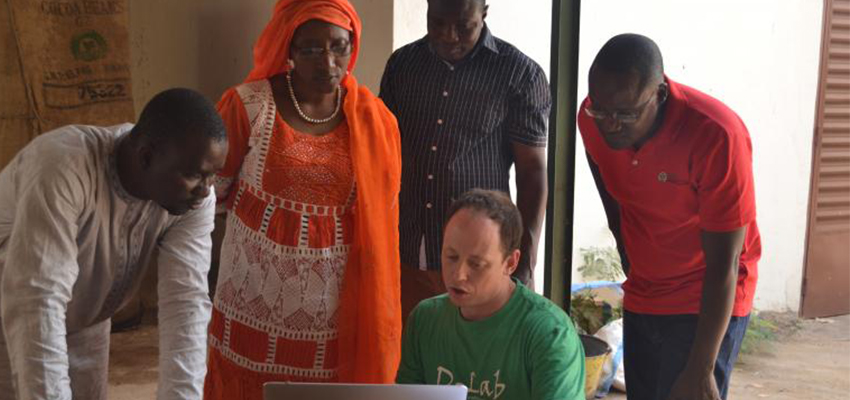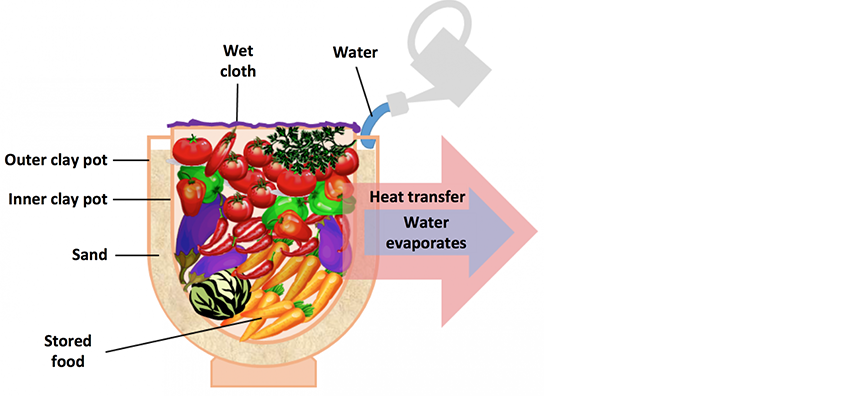
Original article as posted on MIT Climate
Eric Verploegen is a Research Engineer, and Food-Water-Energy Lead at MIT D-Lab. D-Lab is a program that works with communities around the world to develop collaborative approaches and practical solutions to global poverty challenges. Eric’s projects at D-Lab, including the Energy Needs Assessment Toolkit and evaporative cooling for vegetable preservation technology are being utilized in communities to address hunger, poverty, and climate change impacts. To learn more about Eric and his research, read his profile on the MIT D-Lab website, or blog posts about his innovative work on evaporative cooling technology.
Mikaela: Tell us a little bit about you and your background. How did you get involved at D-Lab?
Eric: While working in the energy sector, I became interested in technologies that were specifically targeting low-income off-grid populations, and began volunteering with a few NGOs and social enterprises in the sector. In 2014, I went to a conference run by D-Lab, met some folks from the D-Lab staff, and applied for an open position on the research team related to the evaluation and distribution of solar lighting technologies.
Mikaela: What regions and communities are you working on climate justice projects with?
Eric: A majority of my work is with organizations working in the Sahel region of West Africa that includes Mali, Niger, Burkina Faso, and Northern Nigeria, as well as East Africa and India. The type of organizations we partner with typically are NGOs or social enterprises that are looking to increase access to affordable and beneficial technologies in rural low-income communities.
A majority of D-Lab’s projects are focused on technologies that could provide benefit to rural smallholder farmers. Climate change poses a threat to the livelihood of people living in these communities as it may become increasingly difficult to predict weather patterns and adjust farming practices accordingly. For example, in the dry and arid regions where evaporative cooling devices are most suitable, and where I primarily work, climate change is expected to result in more frequent droughts and floods.
Mikaela: What are your current projects and research interests?
Eric: The first major project that I worked on at D-Lab was developing D-Lab's Energy Needs Assessment Toolkit, which is designed to support organizations looking to identify the most pressing energy needs in the communities where they work. It was through one of these assessments in partnership with the NGO Mercy Corps in Mali that we identified a need for low-cost off-grid technologies for preserving vegetables.
Given the hot and dry climate in Mali, evaporative cooling devices were one of the options that was worth considering.
Mikaela: Could you describe how the evaporative cooling device works?
Eric: To address hunger and crop loss due to climate change, storage solutions for vegetables that prevent spoilage are essential. Evaporative cooling technology creates a stable, low-temperature, high-humidity environment that decreases the rate of respiration and water loss in vegetables. It gives food a longer shelf-life. These devices are designed with double earthenware walls, with the space between the walls filled with wet sand. The inner walls “sweat,” and vegetables stored in them accumulate the condensation. The storage environment also keeps the vegetable temperature stable. These devices can be made with materials, such as clay, brick, sand, charcoal, wood, burlap, twine, that are inexpensive and readily available in most areas thereby ensuring sustainability and accessibility in the communities where they are needed.
Mikaela: What impacts did you notice from the implementation of evaporative cooling devices?
Eric: Due the relative lack of research on the real-world performance and user perceptions of these technologies, we received funding from USAID to conduct an evaluation of evaporative cooling devices for use in households and by smallholder farmers in Mali. I was surprised by both how effective the evaporative cooling devices were, even under non-ideal conditions, and by the benefits that users reported. Given these results, I wanted to learn more about why the use of these technologies was not more widespread and what could be done to increase their dissemination in contexts where they can provide the most value.

Mikaela: What direction do you see your projects taking in the future?
Eric: There are five areas of work that are needed to advance evaporative cooling technologies. These include design research, suitability scoping, scalable dissemination strategies, research on user behavior and impact, and establishing a community of practice. In the next two to three years, working in collaboration with organizations and communities, we hope to have improved access to evaporative cooling technologies and to begin to see significant impact from their widespread use.
Environmental justice on a global scale is of particular importance when considering that the impact of climate change is expected to disproportionately impact the poorest places in the world. The scarcity of access to resources such as food and water are major drivers of poverty. Regions such as the Sahel already suffer from uncertain food and water supplies and are therefore particularly vulnerable to changes in climate that further threaten access to these resources. I am inspired to do work related to environmental and social issues because of the statistics that I have seen illustrating the scale of challenges that we face across the world. But I am not sure that sharing statistics is the most effective way to get people inspired to take action about big problems. I invite people interested in D-Lab and its projects to join the conversation via our Facebook group.
Contact
Eric Verploegen, Research Engineer

